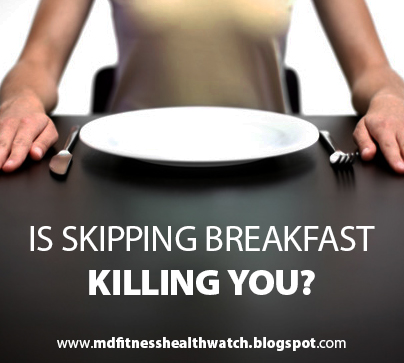Remember your mother telling you not to skip breakfast? Mine did. It turns out that she was right. In fact, recent evidence shows that people who skip breakfast have a 27% higher risk of heart attack or dying from cardiovascular disease.1 How can that be you may ask? It probably comes down to the effect of breakfast on how the body functions - also known as metabolism. In short, eating a good breakfast jump starts your metabolism while stabilizing blood sugar. This lowers the risk for obesity, diabetes, and heart disease. There is also evidence that eating breakfast has a positive effect on the mind, improving cognitive skills, memory, and mood.
One recent study involved overweight women who were all put on a 1400 calorie diet with half of the women being told to make breakfast the larger meal and half to make it the smallest meal.2 The group that made breakfast the larger meal lost an average of 20 lbs compared to the other group who lost an average of 8 lbs. This group also lost twice the waist circumference and showed a greater improvement in blood cholesterol, glucose, and triglyceride levels, despite consuming the same total number of calories.
In spite of some of the recent theories that propose breakfast is not so important, I believe it is clear that breakfast is an important meal, it is equally clear that some foods are better than others and some are downright unhealthy. Remember, the food should be high in protein and nutrients and low in sugar and refined carbohydrates. The term glycemic index is often used to describe the relative effect of the food on insulin and resulting blood sugar. The calorie amount is also important especially if they are what are called “empty calories” - meaning that there are little or no nutrients to offset the calories.
The most healthy breakfast foods include:
- Oatmeal
- Eggs
- Coffee
- Non-fat greek yogurt
- Peanut butter
- Low fat cottage cheese
- Low sugar whole grain cereal
- Whole grain bread
- Fruit ( especially grapefruit, blueberries, strawberries, and bananas)
These foods offer protein, vitamins, minerals, and antioxidants with little or no sugar.
On the unhealthy side are foods high in sugar and refined carbohydrates.
The most unhealthy breakfast foods to avoid:
- Donuts
- Pastries
- Sugared cereal
- Bagels
- Sausage
- Biscuits
- Pancakes
- Flavored non-dairy creamers
These high glycemic index foods cause spikes in insulin and glucose that can lead to obesity, diabetes, and heart disease.
As you can see, there are many popular food items in both the healthy and unhealthy groups. The key is to eat breakfast regularly and stick to foods in the healthy category. This will lessen your urge to snack during the morning and lower the total calories consumed during the day. More importantly, you might just live longer.
1. Journal: Circulation;
Prospective Study of Breakfast Eating and Incident Coronary Heart Disease in a Cohort of Male US Health Professionals
Leah E. Cahill, PhD; Stephanie E. Chiuve, ScD; Rania A. Mekary, PhD; Majken K. Jensen, PhD; Alan J. Flint, MD, DrPh; Frank B. Hu, MD, PhD; Eric B. Rimm, ScD
2. Journal: The Journal of Obesity
High Caloric intake at breakfast vs. dinner differentially influences weight loss of overweight and obese women
Daniela Jakubowicz, Maayan Barnea, Julio Wainstein, Oren Froy


